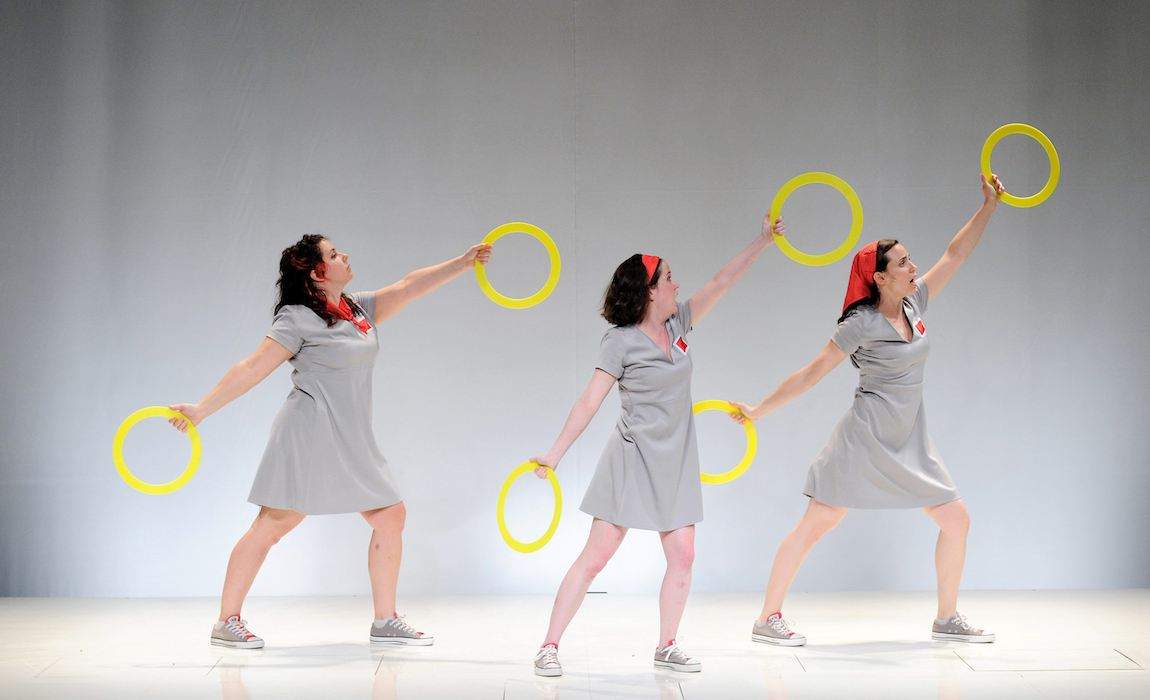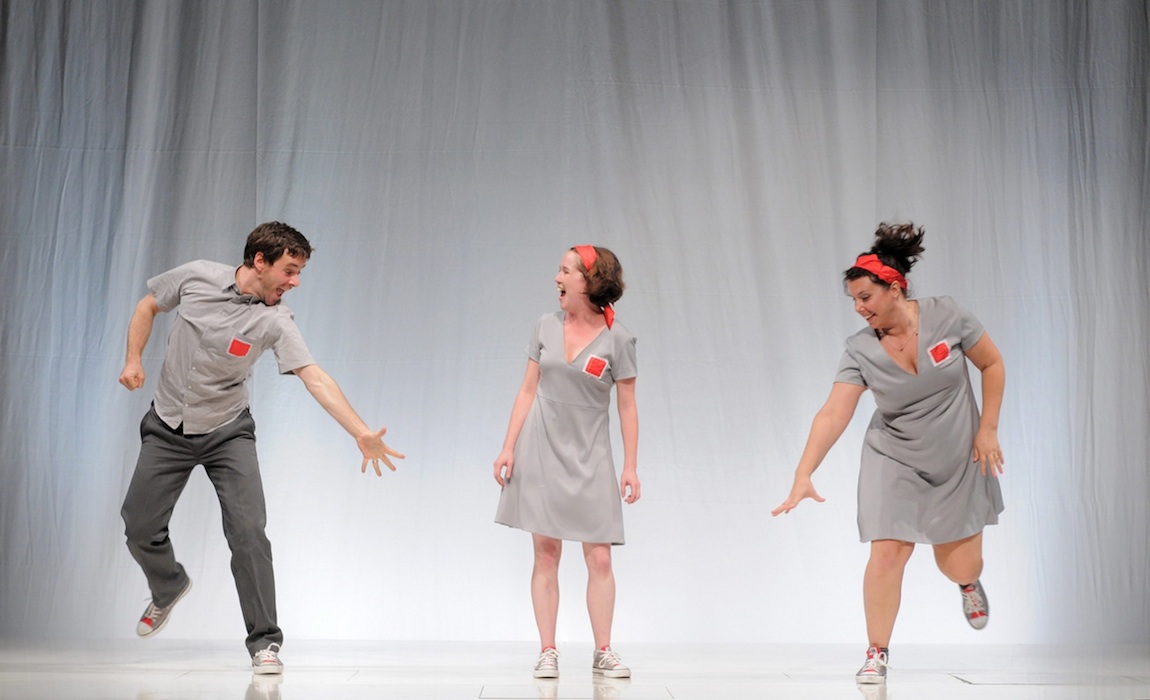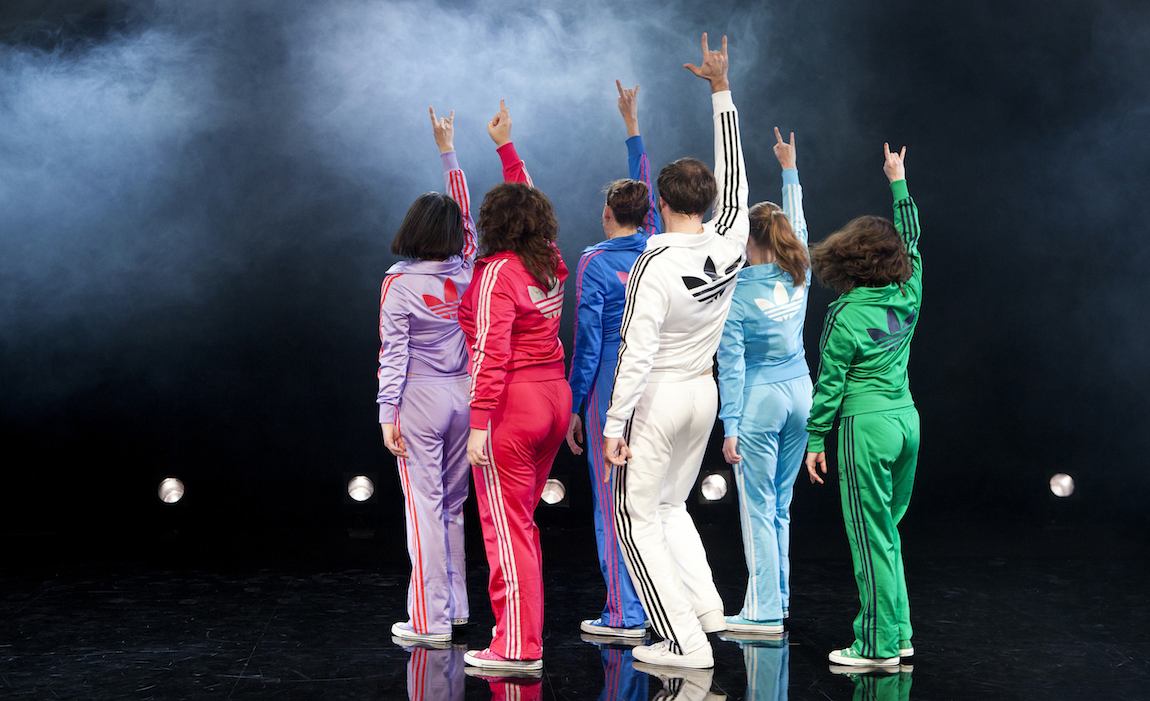Meet the Company Turning a Phone Call Into a 24-Hour Work of Art
A conversation with conversation maestros the Nature Theater of Oklahoma.
Think about the satisfaction of an epic growing out of the tiniest, most humble of origins. Whether it's the highbrow whiff of Proust's madeleine or the spunk'n'egg cocktail of human history, the romantic notion of 'from little things great things grow' is an appealing motif.
In the case of Life and Times, the current mega work by New York-based theatre company Nature Theater of Oklahoma, the starting point was a phone conversation between co-artistic director Pavol Liska and company member Kristin Worrall. Worrall's brief was simple — tell her life story — and yet in the years since that first request in 2007, the verbatim results of her conversations with Liska have expanded into 15 hours worth of theatrical performance out of an anticipated 24.

The art of conversation
The casual language of phone conversations has formed the basis of two previous NTOK productions, No Dice (2008) and Romeo and Juliet (2009), and Liska and his partner, co-artistic director Kelly Copper, regularly chat with an impressive cohort of international artists in their podcast, OK Radio. The art of conversation it seems is, for now at least, a recurring principle of the company's process.
"My education comes from my encounters with all different types of people," says Liska. "As a child you grow up and you meet this person and this person and this person, and I don't want to shut that process down. I know that I can't talk to everybody, so the people I do choose to talk to, I try to talk with them as deeply as possible. I use conversation as a springboard to unbalance myself, to derail myself. Ultimately, I could just lock myself in the closet and talk to myself, but there would be no resistance. So I use the other person to question my own ideas, to unbalance me and derail my own train of thought, and I do that to them as well."
It is this deep process of conversation that provides the wealth of material for NTOK's Life and Times, of which Episodes 1–4 (out of an eventual ten) will be performed at this year's Melbourne Festival. Worrall's life story is not a chronologically linear autobiography, but rather a stream of recollection that fabricates a self-aware state of cause-and-effect as she links events through talking with Liska. The result is, for Liska, a kind of language that "does not belong in the theatre", and one that requires transformation before it is fit for an audience.

Bringing theatre to the everyday
"The more loose the text is, if it's a meandering conversation about something, the harder we have to work in the opposite direction [to formalise it], otherwise it's invisible," says Liska.
A clear example of NTOK's approach to adapting conversational brain-dumping for the stage can be found in the earlier work Romeo and Juliet, which emerged from Liska and Copper calling friends and recording their attempts to recount the plot of Shakespeare's famous tragedy.
"In order to make [these recordings] pop and to open them up, we felt like we needed to use a really formal mode of presentation, that over-the-top, cliched Shakespearean performance style," recounts Liska. As a contrast, after the show's curtain call the company then performed Shakespeare's original version of the balcony scene — in the dark, and understated, as the language was already so theatrical.
“It just wouldn't be enough to present a phone conversation,” says Liska, “maybe some people who work with documentary theatre are okay with that, but ultimately I sit in rehearsal and I go to every performance and I have to find that it's opening something up for myself. It's not a purely humanistic effort — we're not just presenting the conversation and saying, hey, look at how wonderful people are — it's an aesthetic manifesto and an exploration.”

Audiences and the clap
Liska is genuine when he talks about the company exploring language through experimentation with aesthetics, and Life and Times already features a manic diversity in its presentation styles from episode to episode, including a couple that depart from traditional audience-actor theatre experiences altogether.
"Obviously the audience doesn't talk back," says Liska, "but I want the exchange in the room to be a conversation, and my goal is never to allow the audience to forget that they are playing a role in the event. That's why it's so long — so that all these preconceived notions fall away. Something else happens."
While Melbourne audiences will be able to see individual episodes separately, the ideal experience is to front up for the ten-hour marathon and in some way merge meaningfully with Liska, Copper and the gang. “If I have a conversation with you, I don't want you to clap for me at the end,” says Liska.
Although there will be a curtain call at the end of the Melbourne marathon session, it's more because the actors end the fourth episode onstage and to not have applause would just feel weird. However, in between each episode, the cast can be found serving food in the foyer. “People can actually talk to them,” says Liska, “rather than do this — CLAP.”

The Great Nature Theater of Oklahoma is calling you!
There is poetic resonance in this idea of Liska's, given that the Nature Theater of Oklahoma first appeared in Franz Kafka's unfinished novel Amerika as a theatre company that had a place for absolutely anyone who came along. It also rings true with Liska's experience of Eastern European theatre-makers taking action for their community — not simply making art to be consumed. For Liska the important thing is to "stay open and playful and flexible. I wouldn't say that I'd never do a Chekhov play again, or a Greek tragedy — there just has to be a really strong reason to do something, I think that's what the audience finds inspiring.”
For now such inspiration may dwell in a humble, late-night phone conversation, but it's anyone's guess under which pebble NTOK's next epic may be found.

Life and Times is on at the Arts Centre Melbourne from October 22-26. Tickets are available from the Melbourne Festival website.









